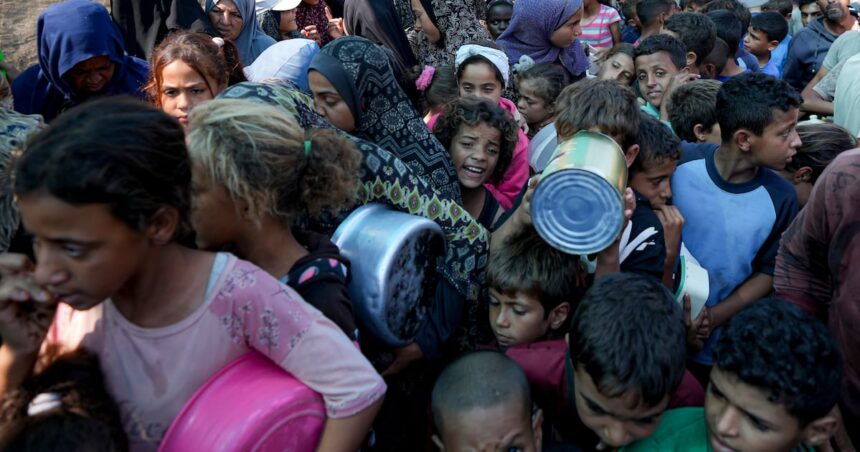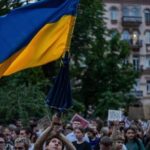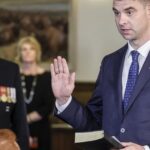The morning briefing at our Gaza bureau now starts with the same ritual: counting who’s still alive. Mohammed, our videographer, lost his cousin yesterday to an airstrike in Deir al-Balah. Faisal hasn’t heard from his parents in northern Gaza for six days. We sip bitter coffee made from recycled grounds as artillery thunder punctuates our conversation.
“I prefer death over this life,” says Mahmud, my colleague who has covered three Gaza wars before this one. His eyes sink deeper into their sockets with each passing week. “We are journalists documenting our own slow extinction.”
The professional distance typically separating reporters from their subjects collapsed months ago. When I arrived from Brussels to cover what many analysts call the most documented war in history, I didn’t anticipate becoming part of the story – sleeping in the same overcrowded shelters, rationing the same dwindling water supplies, and ducking under the same bombardments as those we interview.
The UN Office for the Coordination of Humanitarian Affairs reports that 95% of Gaza’s 2.3 million residents face severe food insecurity. This clinical terminology fails to capture the daily reality: journalists filing stories on empty stomachs, calculating which colleague needs the last protein bar more urgently, or whether to use precious battery power for transmitting footage or calling loved ones.
“We’re making impossible choices every hour,” explains Samira, a local producer who hasn’t changed clothes in three weeks. Her apartment building in Gaza City was destroyed in October. “Do I use water to wash my face or save it for drinking? Do I risk crossing a military zone to interview survivors or stay where it’s marginally safer?”
According to the Committee to Protect Journalists, this conflict has become the deadliest for media workers in decades. At least 116 journalists and media workers have been killed since October 7, the vast majority Palestinian. The psychological toll on those still reporting defies measurement.
Last week in Khan Younis, I interviewed Dr. Kamal Adwan, who runs what remains of the pediatric ward in a partially collapsed hospital. “You journalists come with your cameras, but can you capture the smell of gangrene? Can your microphones record a child’s nightmares?” he asked while treating a five-year-old with shrapnel wounds and no anesthesia. “When you leave, we remain.”
But leaving has become nearly impossible. The Rafah crossing operates unpredictably. Foreign correspondents face brutal ethical calculations: use connections to escape while local colleagues cannot, or stay and risk becoming another statistic? The International Federation of Journalists has condemned the “systematic targeting” of media workers, yet accountability mechanisms remain theoretical abstractions when set against the immediate danger.
In makeshift media centers – often just corners of humanitarian shelters with marginally better internet connectivity – Gaza’s journalists have developed their own support systems. They share chargers, tips on satellite phone maintenance, and psychological first aid techniques. Many sleep in four-hour shifts, waking to file stories during the brief windows when generators provide electricity.
“I’m documenting a genocide that includes my family,” says Omar, a photojournalist whose images have appeared worldwide. Three days ago, he photographed a mass grave containing his uncle and cousins. “My international colleagues ask how I maintain objectivity. I laugh because the question comes from another reality.”
The World Food Programme’s latest assessment indicates adult Palestinians in Gaza consume an average of 245 calories daily – less than a quarter of recommended intake. For journalists constantly moving between bombardment sites, this energy deficit creates physical and cognitive challenges beyond mere hunger. Simple tasks like focusing a camera or transcribing interviews become monumental efforts.
Even those of us with access to organizational resources face stark limitations. Press vests and vehicle markings that once afforded some protection now seem to make little difference. The Foreign Press Association has documented 28 incidents where clearly marked press vehicles were directly targeted or hit in “deconflicted” zones that military authorities had designated safe.
Ahmed, a veteran Gaza correspondent who requested I use only his first name, described the collapse of professional norms: “Before, we worried about balanced reporting. Now we worry about finding enough food to stay conscious while reporting. Before, we debated word choice. Now we debate whether to use our last fuel to charge equipment or run water pumps.”
The physical toll compounds daily. Most journalists I’ve interviewed have lost between 15-30 pounds. Waterborne illnesses affect nearly everyone. Medical supplies for chronic conditions disappeared months ago. Yet they continue working, documenting both the macro political developments and micro human stories that might otherwise vanish.
“Each day I think I cannot continue,” whispers Leila, whose coverage of women in the conflict has been particularly devastating. “Then I remember that if we stop reporting, these people die twice – once physically and once by being forgotten.”
As international attention waxes and wanes, Gaza’s media workers persist through conditions that would shatter most professional standards in normal contexts. They conduct interviews while hungry, edit footage by candlelight, and transmit stories knowing they might be their last.
For those of us cycling in and out of the territory, the privilege of eventual departure carries its own burden. We promise our local colleagues to tell their stories, knowing these promises sound increasingly hollow against the backdrop of continued suffering.
“Just make them see us as humans,” Mohammed told me yesterday as we sheltered during an airstrike. “Not as numbers, not as propaganda, not as political talking points. Just humans who are hungry, exhausted, and dying while the world watches.”






